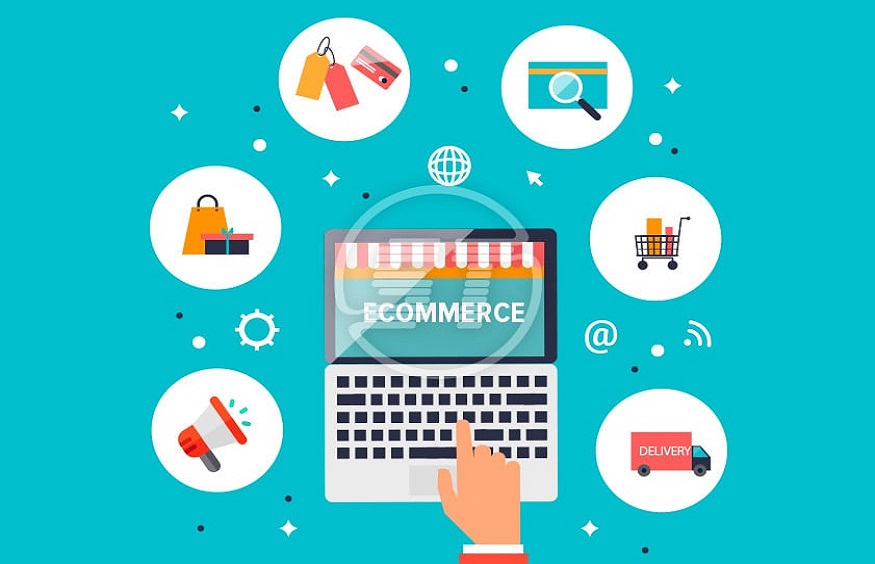Think of eCommerce digital marketing as a toolbox filled with strategies and techniques to promote and sell your products or services online. It is a blend of search engine optimization (SEO), pay-per-click (PPC) advertising, content marketing, email marketing, social media marketing, and more. It is this synergy between eCommerce and digital marketing that allows businesses to stand out and succeed in today’s competitive online world.
In this article, I’ll explore the differences and benefits of each, and how you can harness their combined power. Stay tuned for more on this topic!
*Disclosure: I only recommend products that I would use myself, and all opinions expressed here are my own.
Source: www.freepik.com
Video for online commerce refers to the buying and selling of goods or services using the Internet and transferring money and data to complete these transactions. It is also known as e-commerce or Internet commerce.
E-commerce is often used to refer to the sale of products or services online, but it can also describe any commercial transaction facilitated by the Internet.
Don’t get confused with e-commerce. While e-commerce refers to all aspects of running an online business , electronic commerce specifically refers to the transaction of goods and services.
What is eCommerce Marketing
Ecommerce marketing is a subset of digital marketing that focuses specifically on driving awareness and traffic to an online store or ecommerce platform and converting that traffic into sales and loyal customers. It involves various digital marketing strategies and tools tailored to the unique needs and goals of ecommerce businesses.
Advantages of e-commerce.
Many people have realized that the Web Marketplace is a great platform to start or grow your business. That is why many entrepreneurs invest their time, money and efforts to build profitable niche sites that allow them to sell goods or services online.
Now let’s look at some of the benefits of e-commerce:
Examples of e-commerce sites.
Amazon is probably one of the best examples of a thriving e-commerce business.
Alibaba: Chinese company Alibaba is by far the world’s most successful e-commerce company and retailer, hosting the largest B2B ( Alibaba.com ), C2C ( Taobao.
Walmart: Once the largest retailer in the United States, Walmart has focused heavily on its online business, with excellent results, offering traditional retail sales, as well as grocery delivery and subscription services.
eBay: One of the earliest e-commerce sites, eBay still dominates the digital marketplace space, allowing businesses and individuals to sell their products online and buy through bidding on used items.
You may want to read next:
> Guide to Marketing Automation for Ecommerce (+ Best Tools)
> Top 10 eCommerce Niches to Increase Your Sales.
> Dropshipping Vs Drop Servicing: The Two Hottest Online Trends for E-Commerce.
Digital marketing is the marketing component that uses the Internet and online digital technologies to promote products and services.
It is basically the use of different digital channels to promote products or services.
You can do this by using social media, email marketing, Google search, Google Ads, blogs or websites to attract potential customers.
Domain : Encompasses the entire process of operating an online store or marketplace, including product listing, inventory management, order processing, shipping, and customer service.
Purpose : The primary goal is to facilitate online business transactions. E-commerce businesses focus on converting their website visitors into paying customers and processing these transactions smoothly.
It can be part of a broader business strategy that includes physical (brick-and-mortar) stores or be purely online.
In short, digital marketing is a set of techniques used to promote products or services online, which may include, among others, e-commerce businesses. E-commerce, on the other hand, is specifically about conducting business transactions online. Digital marketing strategies are often used to drive traffic and sales on e-commerce sites .
The confusion people have when comparing e-commerce to digital marketing comes from the fact that they share similar tools.
For example, let’s say you’re using email as a tool. You might send emails to your subscribers to get them to visit a new post where they can buy products from your e-commerce website. In this case, you’re using email as a digital marketing tool to attract your customers.
Now let’s say you send an email and your customers can purchase directly through your email. This would be an example of e-commerce.



